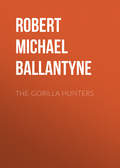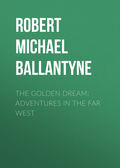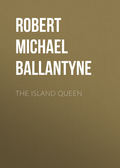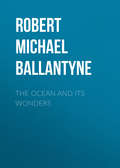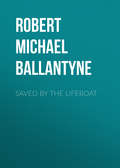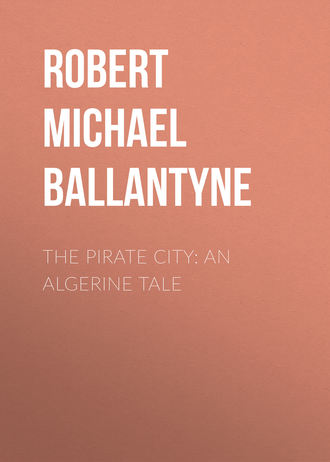
Robert Michael Ballantyne
The Pirate City: An Algerine Tale
“This is the second time,” said Omar, when the culprit was brought before him, “that I have caught you interfering with the slaves.”
“Please, sar, hims was werry bad—dyin’, me s’pose.”
“Speak your own tongue, dog, else you shall smart for it,” said the Minister of Marine, with increasing wrath.
The poor interpreter to his Britannic Majesty’s navy repeated his words in the Lingua Franca, but Omar, again interrupting him, ordered the sbirro to take him off and give him the bastinado.
“And have a care, Blindi,” added Omar, observing that the interpreter was about to speak; “if you say that you are under the protection of the British consul I’ll have you flayed alive.—Off with him!”
The sbirro, with a comrade, led Bobi through several of the narrow streets of the town to a chamber which was set apart for the infliction of punishment. It was a dark, vaulted apartment under a public building. The massive pillars of stone which supported its roof looked pale and ghostlike against the thick darkness which was beyond them, giving the idea of interminable space. One of the sbirros lighted a lantern, and led the way through a massive door, all studded with huge nails, into a small square chamber, the walls of which looked as if they had been bespattered with a dark-brown liquid, especially in the neighbourhood of several iron rings, from which chains depended. In addition to these and a number of other characteristic implements, there was a pile of blood-stained rods in a corner.
Saying a few words to a powerful negro whom they found in attendance, the sbirros handed Blindi Bobi over to him. He instantly disrobed him of his blue gown, and threw him on his back with the aid of an equally powerful assistant, and began to uncover his stomach.
The interpreter was no coward. He had prepared himself to endure manfully the bastinado on the soles of his feet—as it was usually administered—but when he perceived that they were about to inflict the blows on a more tender part of his body, he trembled and remonstrated.
“Sidi Omar no’ say you hit ’im dare. Hims ’peal to British consil—”
Thus far he spoke, from the force of habit, in his adopted tongue, but fear speedily drove him to that of his mother.
All tongues, however, were alike to the negroes, who, rendered callous from long service against their will in a brutalising office, went about their preparations with calm and slow indifference.
Just as they were about to begin, one of the sbirros, who had a personal regard for Bobi, spoke a few words to one of the negroes, who immediately turned Blindi Bobi on his face and firmly raised his feet so that the naked soles were turned upwards. The other negro applied one of the rods thereto with all his might. For a few seconds the poor sufferer uttered no sound, but at last he gave vent to an irresistible yell. At a sign from the chief sbirro the punishment was stopped, and Bobi was released and allowed to rise.
Conducting him to the door, the sbirro thrust him into the street, flung his blue gown after him, and advised him to beware of again rousing the wrath of Sidi Omar.
Blindi Bobi was far too well acquainted with the cruelties perpetrated continually in the pirate city to be ignorant of the fact that he had got off with a light punishment, yet we fear that did not cause him to entertain much gratitude to Sidi Omar as he limped back to his quarters at the Marina.
Arrived there, he observed that the sick old man still lay where he had left him. Running towards him with a sudden impulse, he drew forth his flask, knelt down, raised the old man’s head and gave him a long hearty draught, after which he took another to himself.
“Derre!” he said, rising and shaking his fist defiantly in the direction in which Sidi Omar dwelt, “I’s revenged on you—brute! bah! boo-o!”
After this relief to his feelings Blindi Bobi went home to attend to his poor feet.
Chapter Five.
Shows the Light in which Consuls were Regarded by Pirates, and tells of a Cruel Separation and a Stunning Blow
Seated on a throne in a recess of the audience-chamber of the palace, Achmet Pasha at length condescended to receive Don Pedro, the representative of Spain.
The Dey was robed in barbaric splendour, and absolutely shone with gold embroidery and precious stones. Centuries of robbery on the high seas had filled the treasury of the pirates’ nest to overflowing, not only with hard cash, but with costly gems of all kinds, hence there was a lavish expenditure of jewellery on the costumes of the Dey and his wives and courtiers.
The recess in which he sat had a dome-ceiling, of workmanship so elaborate that there was not a square inch of unadorned stucco on any part of it. It was lighted partly from the roof by means of four minute windows, of yellow, crimson, green, and blue glass. The walls were decorated with coloured china tiles, and the floor was paved with white marble.
In front of the throne or elevated daïs couched the magnificent lion which we have already mentioned. It was the Dey’s whim to use this animal as a footstool on all public occasions, much to the annoyance of his courtiers and household, who felt, although they did not dare to express it, considerable anxiety lest it should take a sudden fancy to feed on human flesh.
Behind the Dey stood several guards, two of whom were negroes.
Don Pedro bowed low on being admitted, and the lion, raising his head, uttered a low growl, which had something distantly thunderous in the tone. Being apparently satisfied that the Don was a friend, it again laid its chin on its paws and appeared to go to sleep.
The Spanish consul was a fine-looking, dignified man, with a nose sufficiently prominent to account for the irreverent reference made to it by Hadji Baba, the story-teller.
In a few words he stated his case touching the female captives recently brought in by Sidi Hassan, and claimed that, as Spanish subjects, they should be set free and placed under his care.
“What proof can you give,” demanded the Dey, “that these ladies are really the subjects of Spain?”
“Alas!” replied Don Pedro, “I have no means of verifying what I say; but I feel assured that your highness will not doubt my word, when I say that, while in my own land, I knew the family to which they belong.”
“That is not sufficient,” returned the Dey. “From all that I can learn, their father lived and died and they were born, in Sicily, and the eldest is the wife of an Italian merchant, who will doubtless be glad to pay a good ransom to get her and his little infant back. As to the sister, we can find room for her in the palace, if she be not ransomed. Besides, Monsieur le Console,”—here the Dey spoke sternly—“your word is not a good guarantee. Did you not give me your word three months ago that your government would pay the six thousand dollars which are still due to us? Why has not this promise been fulfilled?”
“It grieves me, your highness,” replied Don Pedro, with a mortified look, “that this debt has not yet been discharged, but I can assure you that I have communicated with my Sovereign on the subject and have no doubt that a satisfactory explanation and reply will be sent to you without delay.”
“It is to be hoped that such may be the case, for I give you my word—and you may safely rely on it—that if the cash is not sent to me immediately I will send you to work in chains in the quarries with the other slaves.—Go, let your Sovereign know my intention as speedily as may be.”
Lest the reader should be surprised to hear of any consul being thus cavalierly treated, it may be well to explain that the barbarians, who were thus unworthily honoured in being recognised by the European powers at all, were grossly ignorant of the usages of civilised nations, and of the sacred character in which the persons and families of consuls are held. The Deys of Algiers were constantly in the habit of threatening the consuls themselves with flagellation and death, in order to obtain what they desired from their respective governments, and sometimes even carried their threats into execution—as an instance of which we may cite the well-authenticated fact that when the French Admiral Duquesne bombarded Algiers, the consul and twenty-two other Frenchmen were sent out to the fleet in small pieces—blown from the mouths of cannon! True, this was in the year 1683, but up to the very end of their bloody and ferocious domination, the Deys maintained their character for ignorance and barbarity—evidence of which shall be given in the sequel of our tale.
When Don Pedro had been thus ignominiously dismissed, Sidi Hassan was sent for by the Dey. This man was one of the most turbulent characters in the city, and the Dey thought it his wisest policy to secure his friendship if possible by mingling kindness with severity. In the event of this course failing, he comforted himself with the reflection that it would not be difficult to get rid of him by the simple, and too frequently used, process of strangulation. The knowledge that Hassan was a favourite among the Turkish troops prevented his at once adopting the latter method.
He was all urbanity and smiles, therefore, when the pirate captain obeyed his summons. He thanked him for the two pretty slave-girls he had brought in, commended him for his success in taking prizes, and added that he had appointed him to fill the office of attendant janissary upon the British consul.
Up to this point Sidi Hassan had listened with satisfaction, but the appointment just offered seemed to him so contemptible that he had difficulty in dissembling his feelings. The knowledge, however, that his despotic master held his life in his hand, induced him to bow and smile, as if with gratitude.
“And now,” said the Dey, “I have a commission for you. Go to the British consul, tell him of your appointment, and present him with my compliments and with the eldest slave-girl and her infant as a gift from me. Paulina is her name, is it not?”
“Yes, your highness—Paulina Ruffini, and the sister’s name is Angela Diego.”
“Good. Angela you may keep to yourself,” continued the Dey, as coolly as if he had been talking of a silver snuff-box.
Hassan again bowed and smiled, and again had to constrain his countenance to express gratification, though he was not a little disgusted with Achmet’s indifference to the captive girls.
Leaving the palace in a state of high indignation, he resolved to sell Angela in the public market, although by so doing he could not hope to gain so much as would have been the case were he to have disposed of her by private bargain. Thus, with strange perversity, does an angry man often stand in the way of his own interests.
We need scarcely say that, when their fate was announced to the unhappy sisters, they were plunged into a state of wild grief, clung to each other’s necks, and refused to be separated.
Little did Sidi Hassan care for their grief. He tore them asunder, locked Paulina up with her infant, and led the weeping Angela to the slave-market, which was in the immediate neighbourhood of one of the largest mosques of the city.
This mosque, named Djama Djedid, still stands, under the name of the Mosquée de la Pêcherie, one of the most conspicuous and picturesque buildings in Algiers. It was built in the seventeenth century by a Genoese architect, a slave, who, unfortunately for himself built it in the form of a cross, for which he was put to death by the reigning Dey. In front of the northern door of this mosque the narrow streets of the city gave place to a square, in which was held the market for Christian slaves.
Here might be seen natives of almost every country—men and women and children of all ages and complexions, civilised and uncivilised, gentle and simple—exposed for sale; while turbaned Turks, Moors in broad-cloth burnouses and gay vestments, Jews in dark costume, Arabs from the desert, and men of nondescript garments and character, moved about, criticising, examining, buying, and selling.
Just as Sidi Hassan reached the market, a gang of Christian slaves were halted near the door of the mosque. It was evening. They had been toiling all day at the stone-quarries in the mountains, and were now on their way, weary, ragged, and foot-sore, to the Bagnio, or prison, in which were housed the public slaves—those not sold to private individuals, but retained by government and set to labour on the public works.
A few of these slaves wore ponderous chains as a punishment for having been unruly—the others were unshackled. Among them stood our unfortunate friends Francisco Rimini and his sons Lucien and Mariano—but ah! how changed! Only two days had elapsed since their arrival, yet their nearest friends might have failed to recognise them, so dishevelled were they, and their faces so covered with dust and perspiration. For their own garments had been substituted ragged shirts and loose Turkish drawers reaching to below the knee. Old straw hats covered their heads, but their lower limbs and feet were naked; where not stained by blood and dust, the fairness of their skins showed how little they had been used to such exposure. Lucien’s countenance wore an expression of hopeless despair; that of his father, which was wont to look so bluff and hearty, now betrayed feelings of the tenderest pity, as if he had forgotten his own sufferings in those of his children. Mariano, on the contrary, looked so stubborn and wicked that no one could have believed it possible he had ever been a gay, kindly, light-hearted youth! Poor fellow! his high spirit had been severely tried that day, but evidently not tamed, though the blood on the back of his shirt showed that his drivers had made vigorous attempts to subdue him. During the heat of the day Lucien had grown faint from toil and hunger, and had received a cruel lash from one of their guardians. This had roused Mariano. He had sprung to avenge the blow, had been seized by three powerful men, lashed until he became insensible, and, on recovering, had been forced to continue his toil of carrying stones until not only all the strength, but apparently all the spirit, was taken out of him.
From this condition he was reviving slightly when he reached the market-place, and, as his strength returned, the firm pressure of his lips and contraction of his brows increased.
The slave-drivers were not slow to observe this, and two of them took the precaution to stand near him. It was at this critical moment that the poor youth suddenly beheld Angela Diego led into the market—more interesting and beautiful than ever in her sorrow—to be sold as a slave.
Mariano had been deeply touched by the sorrow and sad fate of the sisters when he first saw them on board the pirate-vessel. At this sight of the younger sister, prudence, which had retained but a slight hold of him during the day, lost command altogether. In a burst of uncontrollable indignation he sent one of his guards crashing through the open doorway of the mosque, drove the other against the corner of a neighbouring house, rushed towards Sidi Hassan, and delivered on the bridge of that hero’s nose a blow that instantly laid him flat on the ground. At the same moment he was seized by a dozen guards, thrown down, bound, and carried off to the whipping-house, where he was bastinadoed until he felt as if bones and flesh, were one mass of tingling jelly. In this state, almost incapable of standing or walking, he was carried to the Bagnio, and thrown in among the other prisoners.
While Mariano was being conveyed away, Sidi Hassan arose in a half-stupefied condition from the ground. Fortunately he was ignorant of who had knocked him down, and why he had been so treated, or he might have vented his wrath on poor Angela.
Just at that moment he was accosted by Bacri the Jew—a convenient butt on whom to relieve himself; for the despised Israelites were treated with greater indignity in Algiers at that time than perhaps in any other part of the earth.
“Dog,” said he fiercely, “hast thou not business enough of thine own in fleecing men, that thou shouldst interfere with me?”
“Dog though I may be,” returned Bacri, with gravity, but without a touch of injured feeling, “I do not forget that I promised you four thousand dollars to spare the Christians, and it is that which induces me to intrude on you now.”
“Humph!” ejaculated Hassan, somewhat mollified; “I verily believe that thou hast some interested and selfish motive at the bottom. However, that business is thine, not mine.”
“Whether my motive be interested or not you are well able to judge,” returned Bacri gently, “for the slaves are poor and helpless; they are also Christians, and you know well that the Jews have no love for the Christians; in which respect it seems to me that they bear some resemblance to the men of other creeds.”
Sidi Hassan felt that there was an intended sarcasm in the last remark, but the thought of the dollars induced him to waive further discussion.
“Do you wish to sell the girl?” said Bacri in a casual way, as though it had just occurred to him.
“Ay, but I must have a good price for her,” replied the Turk.
“Name it,” said the Jew; “my wife has need of a handmaiden just now.”
Hassan named a sum much larger than he had any expectation the Jew would give. To his surprise, the other at once agreed to it.
“Why, Bacri,” he said, with a smile, as with his right hand he tenderly caressed his injured nose, “you must have been more than usually successful in swindling of late.”
“God has recently granted me more than deserved prosperity,” returned the other.
Without further palaver the bargain was struck. Hassan accompanied the Jew to his residence in one of the quaint Moorish houses of the old town. Angela was handed over to Bacri’s wife, a pleasant-visaged woman of forty, and Hassan returned home with his pockets well lined, his nose much swelled, and his temper greatly improved.
Bethinking him of the Dey’s commands, he set out with Paulina and her infant for the residence of the British consul, which lay a short distance outside the northern wall of the town, not far from the bluff height on which, at the present day, towers the picturesque pile of Nôtre-Dame d’Afrique.
Chapter Six.
Sends a Gleam of Hope into a Gloomy Region
The short twilight of southern latitudes was giving place to the shades of night, when Bacri the Jew issued from the low door of his house, and threaded the narrow labyrinth of streets which compose the old town of Algiers.
The greater part of the old, or, as it is styled, the Moorish town, remains almost exactly the same at the present time that it was at the time of which our tale treats. It occupied the face of a steep hill, and was built in the form of a triangle, the apex being a fort, or “casba,” near the summit of the hill. The base was a street of oriental houses upwards of half a mile in extent, beyond which the sea-wall, well lined with batteries, rose directly from the beach, and was washed by the spray in every breeze. All the houses facing the sea have now been taken down, and their places are occupied by wide handsome streets of French buildings; the beach and the site of the old wall being occupied by splendid quays, wharves, and terraces.
The houses of the Moorish town were square white-washed blocks, built so close to each other that most of the streets were mere lanes, not more than from six to ten feet wide. No windows worthy of the name garnished the dead white walls of these houses, whose light sprang in reality from within, each house being in the form of a square of building surrounding a central court, which at the top was open to the weather. The real windows of the houses looked into the courts, which, however, were by no means dismal. They had fountains in the midst of them, which sent up a perpetual—and, in such a climate, grateful—sound of trickling water; while in their corners and elsewhere boxes of earth enabled banana-trees, and palms, and various creepers, to convert the little spots into delightful, though miniature, gardens. Such windows as opened outwards were mere loop-holes, not much more than a foot square—many of them less,—the larger of them being always strongly grated. Most of these houses projected beyond their basement storeys, thus rendering the open space above narrower than the streets below, and in many cases the walls absolutely met, and converted the streets into tunnels. Strange wooden props, seemingly insufficient for their duty, upheld these projecting upper storeys, and gave a peculiarly un-European character to the streets,—a character which became still more perplexing to the stranger when he observed here and there, in places where architecture had scarcely space or light to be seen, fountains of the most elegant design and workmanship; doorways of white marble, most elaborately and beautifully carved; and entrance-halls that resembled courts of the Alhambra in miniature.
When one first sees such things they induce surprise, but the surprise evaporates when we reflect that these pirates had at their command the services of thousands of slaves, many of whom represented the artistic talent of the civilised world.
Passing rapidly along these narrow streets, and bending his tall form when he came to low archways, Bacri at length emerged on the chief “high street” of the town, which, entering at the north, or Bab-el-Oued gate, completely traversed the city under that name as far as the Dey’s palace, where it changed its name to Bab-Azoun, and terminated at the south gate of the same name.
In this street was the Bagnio, already mentioned as being the prison of the government slaves.
Here Bacri paused, drew a glittering coin from his pocket, and knocked at a strong oaken door. A janissary opened, and roughly demanded his business, but changed his tone at once and gave the Jew admission, on receiving the coin.
Passing though a lobby, whose marble pillars were sadly broken and disfigured, the Jew entered a courtyard, open to the sky, around which were a number of recesses or cells. In these the unhappy slaves sat huddled together. They were not cold, for it was summer; but their misery and want of space probably induced them to cling closely to each other.
The place had once been a bathing establishment, and an old fountain still gurgled in the centre of the court; but its drains had been choked long ago, and the waters had overflowed, to find exit as they best might, rendering the floor a damp and uncomfortable residence for scorpions, centipedes, and other repulsive insects.
The slaves received only two small rolls of black bread as their rations at the close of each day, and they were too eagerly engaged in devouring these to pay much regard to their visitor.
Looking carefully round, the Jew at length discovered the objects of his search,—Francisco, Lucien, and Mariano Rimini. The two first were seated side by side, eating their meagre meal. Mariano lay near them, heavily laden with irons, and also endeavouring to eat.
“Friends,” said Bacri, approaching them.
“Villain!” cried Mariano, starting up into a reclining attitude, despite the agony that the act occasioned, and fixing his eyes on the Jew.
“You do me injustice, young man,” said Bacri, seating himself on the basement of a pillar.
“It may be that he does you injustice,” said Lucien sternly, “nevertheless we have all of us good reason to believe that you are a friend of the pirate Hassan, and no friend of ours.”
“Whether friend or foe, say thy say, man, and be gone,” cried the bluff Francisco, whose spirit suffered even more than his body from the indignities to which he had been subjected that day.
“Listen, then,” said Bacri impressively. “You know my name and nation, but you do not know that I am the chief of the Jews in this city of devils. I and my people are regarded by these followers of Mohammed as worse than the dogs in their streets, yet, while they treat us with the utmost indignity, they know that we are good traders, and as such bring riches within their walls. I have power—the power of wealth—to help you at a pinch; indeed I have helped you, for it was only by means of a promise of gold that I induced Sidi Hassan to spare your lives when his men were bent on taking them. But that is not what I came to tell you to-night. I came to say that the poor captive girls with whom you voyaged to this place are for the present out of danger.”
“Say you so?” exclaimed Mariano eagerly. “How can that be? Did I not see Angela led to the slave-market this very afternoon?”
“You did, and I purchased her for the purpose of protecting her. She is now in my house. Her sister and the infant have been sent as a temporary gift or loan to the British consul, under whose care she is safe for the present. But be not too sanguine,” added Bacri, seeing that Mariano’s countenance brightened; “the whim of the Dey, or a change of government, which latter is common enough here, may totally alter the state of affairs. If the Dey willed it, I could not hold anything that belongs to me for an hour. They call us dogs, and treat us as such.”
“They are themselves dogs!” cried Mariano indignantly.
“Christians have called us by the same name,” returned the Jew calmly, “thereby proving the falsity of their own faith.”
“Say not so!” cried Lucien with animation. “Many, calling themselves Christians, have undoubtedly treated your race ill, but those who really love the Lord Jesus cannot help respecting the people from whom Himself sprang. I side not with those who disgrace themselves by vilifying the Jews.”
Lucien extended his hand as he spoke, and Bacri grasped it kindly.
“Bah! you are fools; all of you arrant idiots!” cried a wild-looking ragged man in the neighbouring cell, starting up and glaring at them as he clenched his fists. “What avails Christianity, or Judaism, or anything else here? ’Tis a world of fiends!—ha, ha! murderers, tormentors, hypocrites,—ha! ha!”
Here the man gave vent to a burst of wild ferocious laughter, so loud that even the careless and callous warder was disturbed, and rattled his keys as if about to enter. The sound appeared to send a chill to the heart of the captive; an expression of terror overspread his thin haggard features, and he shrunk together as he retired quickly to the remotest corner of his cell.
“A maniac, I fear,” said Francisco in a low tone, observing that the Jew regarded him with a look of pity.
“No, not quite mad,” replied Bacri in the same low tone, “but sometimes very near it, I think. Poor man, I know him well. He has been fifteen years a prisoner in Algiers. When first brought here he was as fine a specimen of a Genoese youth as I ever saw. His name is Lorenzo Benoni. He was captured with his wife and two children, all of whom died before the first year was out. Of course, although in the same city, he was never again permitted to see wife or children. He was very dangerous at first, attacking and nearly killing his guards whenever he got a chance, and frequently attempting to take his own life, so that they were obliged to make him work constantly in heavy irons, and, I need scarcely add, bastinadoed and tortured him until his body became a mass of bruises from head to foot. They subdued him, in the course of years, to a condition of callous and brutal indifference to everything, and at last his great strength began to give way. He is now considered incapable of doing much injury to any one, and seems almost tamed. The Turks think that this has been brought about by sickness and starvation; it may be partly so, but I cannot help thinking that, despite the contempt which, in a sudden burst of passion, he poured on it just now, religion has something to do with it, for I have noticed a considerable change in him since he began to listen to the voice of an old man who has been a true friend of the poor slaves since long before I came here. The old man professes, at least he teaches, your religion; but I know not to what sect he belongs. Indeed, I think he belongs to none. This, however, am I sure of, that he holds equally by our Scriptures and your Testament as being the whole Word of God.”
The three captives listened to this narration with sinking hearts, for it opened up a glimpse of the terrible and hopeless future that lay before themselves, so that for some time they sat gazing in silence at their visitor, and at the miserable beings who were devouring the last crumbs of their black bread around them.
“I came to see you,” continued Bacri, “partly to assure you of the comparative safety of the girls who interested us all so much on board the vessel of Sidi Hassan, and partly to say that I will do what lies in my power to alleviate your sad condition. With Lucien’s education and knowledge of languages, it may be possible to get him into the immediate service of the Dey, in which case he will be able to aid his father and brother.”
“Have you, then, much influence with the Dey?” asked Francisco.
“None,” replied the Jew, with a sad smile. “I have already told you that the pirates detest us; that we are tolerated only because of our money-making powers, and the ease with which they can bleed us when they want gold. But I have some influence with others in the city who have power to move the Dey. There is one thing, however,” here the Jew glanced pointedly at Mariano, “in regard to which I would give you most earnest counsel, namely, that you should at once dismiss all idea of rebellion. It will be utterly unavailing. You may, like the caged lion, if you will, dash yourselves to death against your prison bars, but you cannot break them. Countless thousands of bold and brave spirits have attempted this plan, with no good result, in time past. The Turks are well acquainted with and quite prepared for it. Your only chance of mitigating the woes of your condition lies in submission.”
“It were better and nobler to die than to submit,” said Mariano gloomily.
“It were better and nobler to bow to the will of the Almighty than to commit suicide,” retorted Bacri, somewhat sternly. “It is selfishness and pride which induces us to seek deliverance from sorrow and suffering in death. There are men who have thought that truest nobility lay in choosing a life in the midst of suffering and woe for the purpose of alleviating it, and who have acted on their opinion. This lesson, however, is not so frequently learnt by us through precept as in the school of sorrow.”



